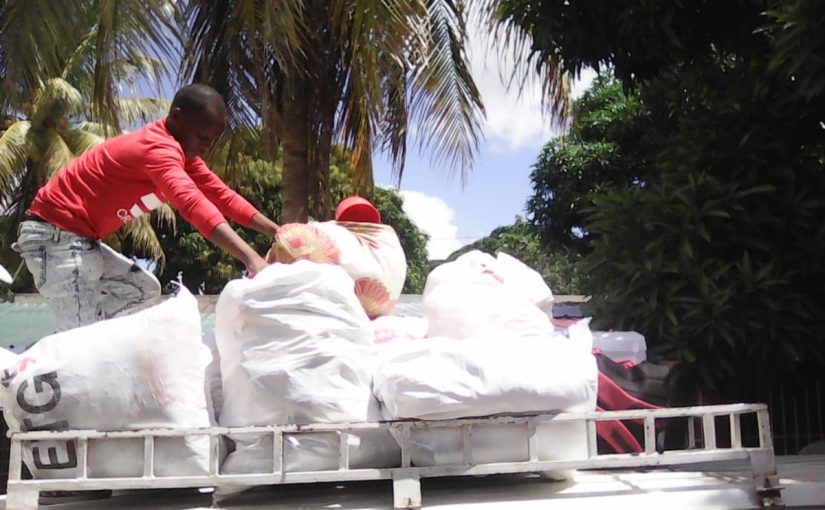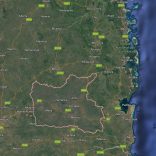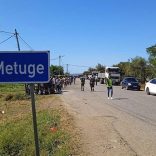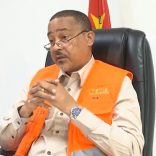Mozambique: Fishermen detained in Ancuabe for alleged involvement in terrorism - AIM
Mozambique|Cabo Delgado attacks: Six tons of donations to support displaced people are on their way to Ibo

Photo: Twitter / @Cidiachissungo
Six tons of donations are being sent to support displaced people in Cabo Delgado, Mozambique, a campaign organiser said, estimating that about 2,000 people internally displaced persons (IDPs) are currently amassed on Ibo Island after fleeing the attacks.
Cídia Chissungo, a member of the Africans Rising organisation and one of the organisers of the “Cabo Delgado Is Also Mozambique” campaign, said that the goods should arrive in Cabo Delgado early next week.
The campaign was launched in the first week of February, and goods were collected in Maputo, Gaza, Manica, Tete, Zambezia, Niassa, Nampula and in Cabo Delgado province itself.
“We want people to be able to leave their homes and feel free to talk about this subject, without fear, because they would be supporting their Mozambican brothers and sisters. We have collected about six tons [of donations] including food, clothing and footwear,” Chissungo told Lusa, adding that she wasn’t expecting such a huge response to the initiative, which then posed logistical difficulties.
Faced with the large amount of donated goods, the organisers requested the support of the National Institute for Disaster Management (INGC) for transportation, but, as a result of Cyclone Idai in mid-March, this was not possible.
“So, a month ago, we decided to look for an alternative and launched a second campaign [‘I want the donations in Cabo Delgado’]. We managed to collect about 74,000 meticais in 24 hours to pay for the transportation, which is leaving today and will pass through the provinces where the donations were collected,” Chissungo said.
The goods are expected to arrive on Monday and Tuesday, and will be delivered to the administrator of the island of Ibo in Cabo Delgado and distributed to the IDPs, with delivery accompanied by campaign activists.
“These were our terms for collecting more donations. Now we have to wait and confirm that the goods actually reach the people and that the families were supported,” Chissungo said.
Chissungo says they will move forward with the second phase of the campaign next week if it certain logistical conditions such as warehousing and transport are met.
Asked how many people the violence in Cabo Delgado has displaced, the head of the donation campaign says it is difficult to estimate, because “it is always changing”. People have moved to other countries, such as Tanzania, or neighbouring provinces, and 2,000 people are estimated to have taken refuge on the island of Ibo.
“That’s why this is where aid is being directed,” said the activist.
Chissungo explained that the idea of drawing attention to the problems in Cabo Delgado came at the end of last year.
“Our government considers the situation in Cabo Delgado to be under control, but in fact it is not. This means that something is failing, so we were demanding that more attention be paid to the province, because Cabo Delgado is also Mozambique.”
She also stressed that “people are afraid to talk about this subject”, noting that journalist Amade Abubacar has been detained for three months for reporting on the events.
“There is a widespread fear of broaching certain issues or demanding some kind of response in our country. People think they are confronting the government,” she said. When she was preparing the solidarity campaign, Chissungo contacted various television channels, but they were not interested in covering the event because it was “a political issue and they did not want problems with the government”.
The number of victims of the attacks in Cabo Delgad, and the reasons for the violence in Cabo Delgado, responsibility for which has never been claimed, remain unclear. The government’s official tally, of 90 deaths, was made in October 2018, a year after the attacks on police stations in Mocímboa da Praia, but the wave of violence continued, with successive raids on remote villages every month.
According to calculations by Lusa based on reports of attacks, at least 170 people have died since October 2017. Chissungo maintains that attacks by the unidentified armed groups have cost more than 200 lives.
“The government wanted to show that [the attacks] did not exist and they did everything to hide them. By October of last year, there were not even numbers, but every day there were attacks and nobody updated the total,” she says, explaining that media channels like ‘Carta de Moçambique’ say that the insurgency had claimed more than 200 victims, figures which the government has never denied.
Os donativos que se encontravam em Nacala já estão a seguir para Cidade de Nampula, para esperar o carro que sai de Maputo a recolher, rumo a #cabodelgado para apoiar centenas de deslocados, vítimas dos ataques desumanos desde 2017.
Campanha: #CaboDelgado_também_é_Mocambique pic.twitter.com/PH8qMMTwYa— Cídia Chissungo (@Cidiachissungo) April 3, 2019
Recordam-se dos vossos donativos para apoiar as vítimas dos ataques em #CaboDelgado? Pois, amanhã saem de Maputo rumo ao seu destino final.
A campanha #CaboDelgado_também_é_Moçambique está a 65% de terminar pic.twitter.com/ONin0jYGLD— Cídia Chissungo (@Cidiachissungo) April 2, 2019












Leave a Reply
Be the First to Comment!
You must be logged in to post a comment.
You must be logged in to post a comment.